Pat Meehan's sexual harassment settlement: nearly $40,000
Rep. Pat Meehan used just under $40,000 of taxpayer money to settle a sexual harassment claim last year according to another Congressman and two other sources familiar with the agreement. The settlement's amount was not known, but its existence helped force Meehan to drop his reelection bid last week.

WASHINGTON — The aide who accused Rep. Pat Meehan of sexual harassment last year received nearly $40,000 in a taxpayer-funded settlement to resolve the claim, according to three sources familiar with the case.
The payout, which had not been previously disclosed, came from the Delaware County Republican's congressional office account, which is typically used for staff, office expenses, and other official costs. Using it allowed him to pay the settlement without the approval of fellow lawmakers who oversee the House's designated fund for workplace harassment and discrimination claims. Instead, Meehan said in an interview Jan. 23, he got the go-ahead to use his office fund from the House Ethics Committee. He was a member of the committee at the time of the approval.
"I got that approval and it gave [House lawyers] the authority to enter into negotiations," he told the Inquirer and Daily News then. He would not disclose the amount, citing a confidentiality agreement with his accuser, but stressed that using his congressional fund was legal and allowed under House rules.
Rep. Bob Brady, a Philadelphia Democrat, told the newspapers Wednesday that Meehan's settlement was for $38,000 or $39,000. Brady has a close working relationship with Meehan and is the top Democrat on the House Administration Committee, which oversees the House's official workplace harassment and discrimination fund — although he did not review Meehan's settlement in that role, since the Republican did not use that account.
Two other sources familiar with the settlement separately said that it was for around $39,000, saying the amount was based on one month's pay for every year of the aide's roughly six years in Meehan's office. Neither of those sources would be named discussing the confidential settlement.
Meehan's office declined to comment for this story, but in his earlier interview, he called the payment "a severance."
"Using a severance was a recognition of the value of work that was done over a number of years," he said.
The amount Meehan paid is significantly less than the $84,000 paid to settle a sexual harassment claim against Rep. Blake Farenthold (R., Texas). It exceeds the $27,000 paid by Rep. John Conyers Jr. (D., Mich.), who was accused of firing an aide who rejected his sexual advances, a claim he denied.
The payment in the 2014 Farenthold case came from the House fund dedicated to workplace mistreatment claims. Conyers' money, like Meehan's, came from his office account.
Meehan has denied any harassment but announced last week that he would not seek another term as he faced a backlash over his settlement of the accusation.
Meehan said he would repay the public funds if the Ethics Committee finds that he did in fact commit sexual harassment. The panel is reviewing his actions, and he was removed from the committee in January, after the settlement was revealed by the New York Times, which reported only that it was worth "thousands."
Meehan, 62 and married, was accused by his aide of expressing romantic feelings toward her and turning hostile when she began a serious relationship with another man, according to the Times. Meehan said he saw the aide as a "soul mate" but remained loyal to his wife and never sought a romantic or sexual relationship.
In the interview last week, he said he was advised by House attorneys that settling the claim using his office account was possible, and that other lawmakers had followed a similar route. While Conyers is a known example, it's unclear how many others have done so, since such payments are not publicly revealed.
Meehan said he was told last year that the House Administration Committee was unlikely to approve a settlement from the formal fund for harassment cases. A spokeswoman for the committee's chairman, Rep. Gregg Harper (R., Miss.), said in an email Thursday that no requests for any types of settlements have come to him since he took charge last year, and that he would handle any such issues on a case-by-case basis, but that he believed "members, not taxpayers, should ultimately pay the cost to settle a claim of sexual harassment."
With that option closed off and the dispute likely headed into litigation, Meehan said he wanted to find a path that would resolve it without a public fight and allow him and his former aide to move on. So he turned to his congressional account.
"When we were in litigation mode, it was suggested to me that there might be another option," Meehan said in last week's interview.
Alexis Ronickher, the former aide's attorney, declined to comment on the amount of the settlement. She previously called the accusation against Meehan "a serious sexual harassment claim."
Brady has co-sponsored legislation to rewrite Congress' rules on sexual harassment cases, including provisions requiring lawmakers to personally repay any settlements and barring them from using their taxpayer-funded Member Resource Accounts, as Meehan did. Any settlements would be published online every six months.
This story has been updated to include more detailed comments from Rep. Gregg Harper.